Tonkinese is originated from Canada but Viverral is originated from United States. Both Tonkinese and Viverral are having almost same weight. Tonkinese may live 3 years more than Viverral. Both Tonkinese and Viverral has same litter size. Tonkinese requires Moderate Maintenance. But Viverral requires Low Maintenance
Basic Information
undefined
Canada
United States
Life Span:
10 - 18 Years
10 - 15 Years
Colors Available:
4 Base colors - medium brown, champagne, blue and and platinum.
Cream, black, tan - spots
Coat:
Short and silky
Short and plush
Temperament:
Affectionate, Alert, Cheerful, Curious, Energetic, Friendly, Gentle, Independent, Intelligent, Lively, Loving, Loyal, Outgoing, Playful, Responsive, Social, Stubborn, Sweet, Territorial
Affectionate, Aggressive, Alert, Cheerful, Curious, Energetic, Friendly, Independent, Intelligent, Lively, Loving, Loyal, Outgoing, Playful, Responsive, Social, Stubborn, Territorial
Grooming:
Moderate Maintenance
Low Maintenance
New Owners Friendly:
Yes
Yes
History
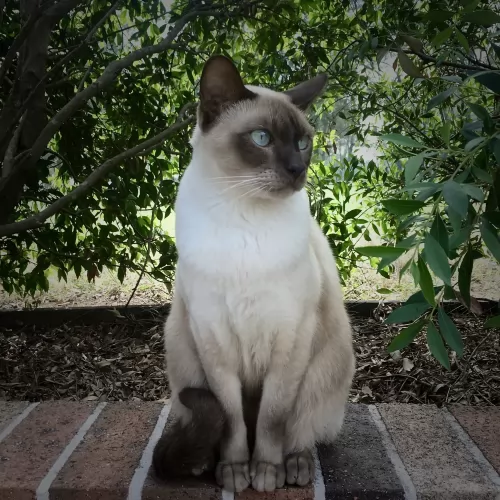 It was about in 1960 that a breeding program was established for these cats. The Tonkinese is a cat that hails from Canada and it was a certain Jane Batlett who was responsible for breeding this cat.
It was about in 1960 that a breeding program was established for these cats. The Tonkinese is a cat that hails from Canada and it was a certain Jane Batlett who was responsible for breeding this cat.
She wanted a cat that was in between the Burmese and Siamese.
Also, Margaret Conroy, another breeder, set up her breeding program between a Burmese female with a Siamese. Both Conroy and Bartlett worked together on the breed and the Tonkinese came about. The Cat Fanciers Association recognized this cat breed in 1984.
This is a rare cat breed and therefore not much information on it is available.
It does seem that in 2002, a 5th generation Viverral was developed and this established the breed.
The cat is described as a fishing cat hybrid. A breeding program was started but it is thought that the cat became extinct.
Description
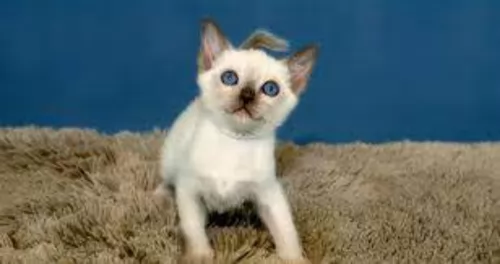 As a medium-sized cat, with a firm, muscular body, your Tonkinese will weigh between 2.5 – 6kg.The head is slightly rounded with fairly broad ears that are set wide apart.
As a medium-sized cat, with a firm, muscular body, your Tonkinese will weigh between 2.5 – 6kg.The head is slightly rounded with fairly broad ears that are set wide apart.
The eyes are bigger than the classic Oriental shape and can range from green to light blue in color.
The coat of the Tonkinese is short and close-lying and is soft and silky to touch. The mask, the ears, legs and tail are all darker than the body.
The Tonkinese cat breed is recognized by the Cat Fanciers' Association in 4 base colors - medium brown, champagne, blue and and platinum.
Temperament:
The Tonkinese cat, with one of its parents being the Siamese cat, just loves giving and receiving attention.
Active and social, he is an excellent choice for families with children and even other pets. They love just seeking out their human companions and lying down where they are.
They’re intelligent felines these, and you can even teach them some simple commands. Because of them being so very social, they don’t like to be left on their own – certainly not for the whole day while you go off to work.
Ideally, it would be nice to have two of these cats together.
The Viverral is muscular and substantial. He has a smallish head and smallish ears with a thick tail.
The coat is spotted. The base color of the coat and the spots should be different. The light cream underbelly is also spotted.
Large, muscular, and solid, the cat’s eyes are big and round in the smallish heald. The coat is short and plush with a spotted pattern of black, brown or tan spots.
Temperament:
The Viverral cat has been designed to produce friendly kittens that are curious and confident. They turn out strong and confident and are suitable as house cats.
New cat owners might have success with them and they can even be friendly with children in the home, but the truth remains, they are unpredictable.
Beautiful and something unique, it is not likely though that this cat breed would have wanted to be cuddled and petted by his human owners.
Characteristics
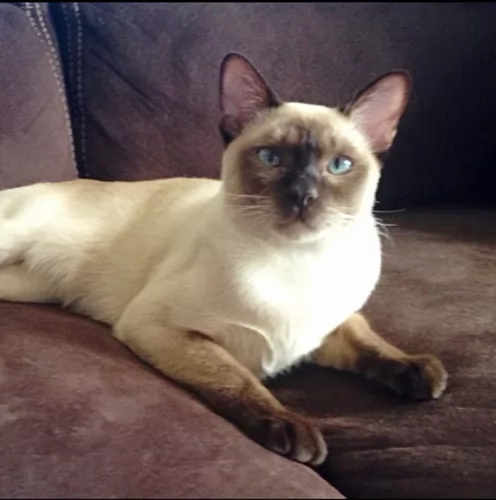 Tonkinese cats can be active and highly entertaining with their antics. When you laugh at them, they are encouraged to perform more.
Tonkinese cats can be active and highly entertaining with their antics. When you laugh at them, they are encouraged to perform more.
They are affectionate and intelligent cats and you will need to have toys for him. When he isn't playing, he likes nothing more than to be petted and pampered by his human family.
Your Tonkinese will get on well with children and other pets, and he generally makes a splendid pet for those who care well for him.
Hybrid cats such as the Viverral can look quite a bit like a wild cat and this is what first appeals to cat lovers. They want an exotic cat to brag about.
However, these cats can come up with a whole lot of behavioral problems so that you wish you had never got one. One should just go along to some of the many cat shelters there are to discover how many hybrid cats land up there.
They turned out to be a disappointment – their behavior wouldn’t conform to what their human family expected of them. This is the story of hybrid cats. Humans want some exotic looking animal to please their greedy natures and then when the cats don’t behave the way they should, they get rid of them. Rather, it is humans that need to change their behavior and leave wild animals alone.
The Viverral can have their good side and be splendid pets but they aren’t consistent. They have a streak of unpredictability, and they also have issues with the use of a litter box.
They mark their territory too and can show some aggression. Any animal with a wild side isn’t going to make the best pet, but still, some cat lovers have managed to bring out their best side.
Health Problems
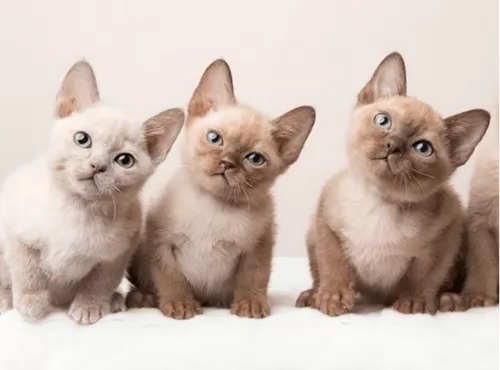 Tonkinese are generally healthy cats but they can be prone to eye problems such as gingvitis.
Tonkinese are generally healthy cats but they can be prone to eye problems such as gingvitis.
Because they are part of the Siamese family, they can succumb to some of the diseases that the Siamese battles with. These are asthma/bronchial disease, heart defects, lymphoma, and crossed eyes.
Lymphoma:
Lymphoma is a cancer of the lymphocytes - cells involved in the immune system.
Lymphoma is linked with feline leukemia, a viral infection, and thankfully, more cats are being vaccinated for feline leukemia, so fortunately it is becoming less common.
Intestinal lymphoma affects the gastrointestinal tract and is the most common type of lymphoma in cats, being more common in older cats. Affected cats can suffer with weight loss, vomiting, and diarrhea. Get your cat to the vet as diagnosing this lymphoma will require the vet finding cancerous cells on microscopic examination.
The development of hybrid cats began as a scientific effort in the 1970s. Hybrid pets can be aggressive and also solitary.
Hybrid cats are an unnatural breeding. They are cat species that weren’t meant to mate in the first place. Breeders tell stories of premature births and also aborted pregnancies.
Some of the more common illnesses among hybrid cats include digestive issues. Also, vaccinations used to protect our domestic cats from disease have not been approved for use in hybrid animals.
A hybrid cat has a wild side to him. These cats were bred to look like a wild cat, and although they are healthy, they can also have some health issues.
Ensuring the cat has a proper diet will contribute more to better health. As mentioned, some of these cats can battle with the likes of chronic diarrhea and irritable bowel disease and also battle with intestinal parasite issues.
Caring The Pet
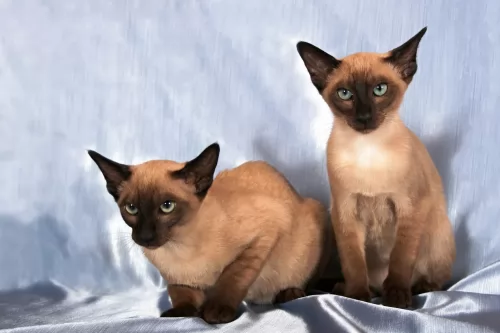 The Tonkinese has a short coat so a brush once a week will be sufficient for this cat as it just helps to brush away dust and loose hairs.
The Tonkinese has a short coat so a brush once a week will be sufficient for this cat as it just helps to brush away dust and loose hairs.
He will need a litter box and this will need to be kept spotlessly clean. Use a small rake, available from your vet or local pet shop, to rake up the cat’s feces.
When you first bring your Tonkinese cat home, you will at least need some of the basics to ensure his wellbeing. These are -
sleeping equipment – baskets or cushions in a nice warm, dry place for your cat.
Food and water bowls.
A cat tree for climbing and a scratching post. Cats are natural scratchers so you can’t get angry with your cat for scratching. Instead, invest in a scratching post so that he doesn’t use your furniture to scratch on.
Food is such an important part of caring for a cat. The best type of cat food can ensure your cat has a strong immune system that allows him to not succumb to every cat sickness there is.
Cats are carnivores so ensure he has food high in meat. Sometimes it can be costly, but try to provide your cat with the best, most high-quality cat foods there are to ensure his good health and happiness.
A cat needs a constant supply of fresh, cool water night and day. The water should be changed regularly.
These are different cats to your regular domestic cat, and they will require different care. One of the things you need to do for a cat like this is provide it with an outdoor enclosure.
Because of their wild side, they are longing to be outdoors and you may find it difficult integrating such a cat into your home.
The Viverral needs plenty of exercise but you can’t just let them roam freely outdoors. Yes, you can train them to walk with a leash but you need to allow him outside in the enclosure. You can include a shallow paddling pool for him too.
These are active, intelligent cats and you will need to invest in some interactive toys for him to keep him amused.
You will need to supply this cat with a scratching post and a climbing tree. This is because as a cat, he is a natural climber and scratcher and he will need these in his life.
Ensure your feline pet has a nice warm, dry place to sleep.
Comparison with other breeds
- Tonkinese vs Abyssinian - Breed Comparison
- Tonkinese vs Aegean - Breed Comparison
- Tonkinese vs African Serval - Breed Comparison
- Tonkinese vs Chausie - Breed Comparison
- Tonkinese vs American Bobtail - Breed Comparison
- Tonkinese vs American Curl - Breed Comparison
- Tonkinese vs American Keuda - Breed Comparison
- Tonkinese vs American Longhair - Breed Comparison
- Tonkinese vs American Polydactyl - Breed Comparison
- Tonkinese vs American Shorthair - Breed Comparison
- Tonkinese vs American Wirehair - Breed Comparison
- Tonkinese vs Applehead Siamese - Breed Comparison
- Tonkinese vs Ashera - Breed Comparison
- Tonkinese vs Asian - Breed Comparison
- Tonkinese vs Asian Semi-Longhair - Breed Comparison
- Tonkinese vs Australian Mist - Breed Comparison
- Tonkinese vs Balinese - Breed Comparison
- Tonkinese vs Bengal - Breed Comparison
- Tonkinese vs Bicolor - Breed Comparison
- Tonkinese vs Birman - Breed Comparison
- Tonkinese vs Blue Russian - Breed Comparison
- Tonkinese vs Bombay - Breed Comparison
- Tonkinese vs Brazilian Shorthair - Breed Comparison
- Tonkinese vs Bristol - Breed Comparison
- Tonkinese vs British Longhair - Breed Comparison
- Viverral vs Abyssinian - Breed Comparison
- Viverral vs Aegean - Breed Comparison
- Viverral vs African Serval - Breed Comparison
- Viverral vs Chausie - Breed Comparison
- Viverral vs American Bobtail - Breed Comparison
- Viverral vs American Curl - Breed Comparison
- Viverral vs American Keuda - Breed Comparison
- Viverral vs American Longhair - Breed Comparison
- Viverral vs American Polydactyl - Breed Comparison
- Viverral vs American Shorthair - Breed Comparison
- Viverral vs American Wirehair - Breed Comparison
- Viverral vs Applehead Siamese - Breed Comparison
- Viverral vs Ashera - Breed Comparison
- Viverral vs Asian - Breed Comparison
- Viverral vs Asian Semi-Longhair - Breed Comparison
- Viverral vs Australian Mist - Breed Comparison
- Viverral vs Balinese - Breed Comparison
- Viverral vs Bengal - Breed Comparison
- Viverral vs Bicolor - Breed Comparison
- Viverral vs Birman - Breed Comparison
- Viverral vs Blue Russian - Breed Comparison
- Viverral vs Bombay - Breed Comparison
- Viverral vs Brazilian Shorthair - Breed Comparison
- Viverral vs Bristol - Breed Comparison
- Viverral vs British Longhair - Breed Comparison
 Petzlover
Petzlover It was about in 1960 that a breeding program was established for these cats. The Tonkinese is a cat that hails from Canada and it was a certain Jane Batlett who was responsible for breeding this cat.
It was about in 1960 that a breeding program was established for these cats. The Tonkinese is a cat that hails from Canada and it was a certain Jane Batlett who was responsible for breeding this cat. As a medium-sized cat, with a firm, muscular body, your Tonkinese will weigh between 2.5 – 6kg.The head is slightly rounded with fairly broad ears that are set wide apart.
As a medium-sized cat, with a firm, muscular body, your Tonkinese will weigh between 2.5 – 6kg.The head is slightly rounded with fairly broad ears that are set wide apart. Tonkinese cats can be active and highly entertaining with their antics. When you laugh at them, they are encouraged to perform more.
Tonkinese cats can be active and highly entertaining with their antics. When you laugh at them, they are encouraged to perform more. Tonkinese are generally healthy cats but they can be prone to eye problems such as gingvitis.
Tonkinese are generally healthy cats but they can be prone to eye problems such as gingvitis. The Tonkinese has a short coat so a brush once a week will be sufficient for this cat as it just helps to brush away dust and loose hairs.
The Tonkinese has a short coat so a brush once a week will be sufficient for this cat as it just helps to brush away dust and loose hairs.